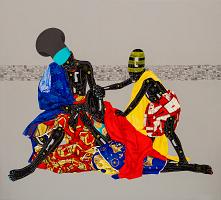MA Filmmaking (Sound Recording, Post-Production & Design)
Content navigation menu
Why study MA Filmmaking (Sound Recording, Post-Production & Design) at Goldsmiths
On this Masters you'll learn the fundamental technical skills necessary to begin a career in screen sound, both as a location sound recordist and post-production sound designer. But equally importantly, you will gain an understanding of how a film’s narrative relies on the precise partnership between image and sound.
- Within this MA programme you'll expand your existing knowledge of sound. Through recording and design you'll investigate what it means to listen with awareness and to translate that experience to your audience. And you'll study how sound is created, how you can manipulate its form, whether it’s natural, synthesised, digitised or analogue, and how to work with sound as a storytelling medium.
- MA Filmmaking is housed in a new purpose-built media facility equipped with state-of-the-art teaching spaces including a film studio for sound shooting, Pro Tools suites, Audio Postproduction facilities with Foley recording studios, Avid Media Composer, screening rooms and an Avid NEXIS network linking all teaching spaces.
- Goldsmiths is an Avid Learning Partner offering Sound students accredited training in Pro Tools and the opportunity to certify as an Avid Pro Tools Specialist, enhancing student's skills and CV.
- The Sound curriculum focuses on the structure of the soundtrack, deconstructing it from its beginnings in pre-production to the final mix, experimenting with the ways in which different components (dialogue, atmospheres, sound effects, music) allow an audience to engage with a film’s story. Through iterative exercises, group reviews and regular feedback, you gain the awareness and ability to construct soundtracks that interpret stories through sound.
- As a sound specialist you work on one film each term, ending with a major production.
- You learn about related fields such as directing, editing, producing and documentary, and work with students across specialisms within Goldsmiths Screen School.
- You'll also benefit from guest lecturers who bring their professional expertise into our classrooms. Last year, specialist classes featured Oscar-winning sound recordist Ray Beckett (The Hurt Locker), film/TV sound editor Adele Fletcher (The Imaginarium of Doctor Parnassus) and composer Stuart Earl (The Secret Agent, Lilting).
- In addition, MA Filmmaking students collaborate with composers and players from Goldsmiths’ Department of Music who offer a wide range of musical styles from classical to electronic to popular. Pro Tools tuition is offered to all Sound Recording, Post-Production & Design pathway students giving you the opportunity to achieve Pro Tools Certified User accreditation.
- The Department of Media, Communications and Cultural Studies has been ranked second in the UK for 'world-leading or internationally excellent' research (Research Excellence Framework, 2021) and 16th in the world (third in the UK) in the 2024 QS World Rankings for communication and media studies.
Contact
If you have specific questions about the degree, contact Femi Kolade or Sam Mason.
Length
1 year full-time
Entry requirements
An undergraduate degree of at least 2:2 standard in a relevant/related subject. Experience working with sound and image and proficiency with Pro Tools is recommended. You might also be considered if you have relevant experience and can show you can work at postgraduate level.
Fees
Home - full-time: £17000
International - full-time: £32000
School
What you'll study
You will take the following modules:
| Module title | Credits |
|---|---|
| Sound Recording, Post-Production and Design: Specialist Skills | 60 credits |
| Final Project | 60 credits |
Your final project will be assessed by a portfolio of work and a viva that reflects your practice.
Note about optional modules (if available): The above is indicative of the typical modules offered, but is not intended to be construed or relied on as a definitive list of what might be available in any given year. The module content and availability is subject to change.
Overview
For two terms you will spend a full day a week in specialised contact with your specific programme convenor. These sessions include:
- Practical demonstrations and exercises
- Lectures
- Screenings
- Small group seminars
- Workshops
You will also take three optional modules, taught through practical workshops and hands-on experiences, as well as critical discussion and essay writing.
The third term will be taken up with your substantive Final Project and you will take part in a series of progress and feedback meetings.
Group film projects
You will work with other students from across the five MA Filmmaking fiction pathways to create film crews in a professional structure.
This allows you to develop realistic industry experience while making work with extremely high production values.
Entry requirements
You should have (or expect to be awarded) an undergraduate degree of at least second class standard in a relevant/related subject as well as a level of practical experience from work in the arts or the media.
Experience working with sound and image and proficiency with Pro Tools (equivalent to Pro Tools 101) is recommended.
You might also be considered for some programmes if you aren’t a graduate or your degree is in an unrelated field, but have relevant experience and can show that you have the ability to work at postgraduate level.
Because funding deadlines and requirements vary around the world, applications are considered on a rolling basis and places on the programme fill up across the recruitment cycle. For this reason, we strongly advise you to submit your completed application as early as you can.
International qualifications
We accept a wide range of international qualifications. Find out more about the qualifications we accept from around the world.
If English isn’t your first language, you will need an IELTS score (or equivalent English language qualification) of 7.0 with a 7.0 in writing and no element lower than 6.5 to study this programme.
How to apply
Apply directly to Goldsmiths using our online application system
You apply directly to Goldsmiths using our online application system.
Before submitting your application you’ll need to have:
- Details of your academic qualifications
- The email address of your referee who we can request a reference from, or alternatively a copy of your academic reference
- Copies of your educational transcripts or certificates
- A personal statement – this can either be uploaded as a Word Document or PDF, or completed online. Please see our guidance on writing a postgraduate statement and ensure that you answer the following questions in your statement:
- Tell us about your passion and aptitude for filmmaking
- What are your dreams and aspirations?
- How did your engagement with visual media develop, and how has it developed in terms of professional, voluntary and personal work?
- Examples of your recent work in a related field (eg moving image samples), preferably via a web link to your online portfolio – please upload this under 'additional' in your online application (NB the maximum file size you can upload is 20MB)
- IELTS 7.0 at the point of application
You should emphasise your practical/theoretical experience in the arts or the media in your application.
You'll be able to save your progress at any point and return to your application by logging in using your username/email and password.
References
Our departmental preference is for referees to upload a confidential reference to the on-line admissions system. Please make sure to select the option for your referees to be automatically notified of the need for them to submit a reference on your behalf.
When to apply
We accept applications from November for students wanting to start the following September.
We may consider late applications if there are vacancies. Complete applications are considered in batches from February onwards. Please note, assessment of MA Filmmaking applications can take several months as there are a limited number of places on the programme. Due to the unique selection process, we ask that all applicants wait to be contacted by the Admissions Team regarding their application.
Unless there are still vacancies it is unlikely applications received after 30 June will be considered.
We encourage you to complete your application even if you haven't finished your current programme of study. It's very common to be offered a place that is conditional on you achieving a particular qualification.
If you're applying for funding, you may be subject to an earlier application deadline. Find out more about fees, funding & scholarships at Goldsmiths.
Selection process
Admission to many programmes is by interview, unless you live outside the UK. Occasionally, we'll make candidates an offer of a place on the basis of their application and qualifications alone.
Please be aware that some pathways of MA Filmmaking tend to be heavily subscribed, so please feel free to apply for more than one pathway to increase your chances of being offered a place. If you do apply for more than one pathway, please indicate in your personal statement your preferred pathway.
Find out more about applying.
Fees and funding
Annual tuition fees
These are the PG fees for students starting their programme in the 2025/2026 academic year.
- Home - full-time: £17000
- International - full-time: £32000
If your fees are not listed here, please check our postgraduate fees guidance or contact the Fees Office, who can also advise you about how to pay your fees.
It’s not currently possible for international students to study part-time under a student visa. If you think you might be eligible to study part-time while being on another visa type, please contact our Admissions Team for more information.
If you are looking to pay your fees please see our guide to making a payment.
Funding opportunities
Explore the Goldsmiths scholarships finder to find out what funding you may be eligible for.
Paying your fees
Find out about paying your tuition fees.
If you are a UK student you may be eligible for a postgraduate loan.
Meanwhile our Careers Service can also offer advice on finding work during your studies.
Additional costs
In addition to your tuition fees, you'll be responsible for any additional costs associated with your course, such as buying stationery and paying for photocopying. You can find out more about what you need to budget for on our study costs page.
There may also be specific additional costs associated with your programme. This can include things like paying for field trips or specialist materials for your assignments. Please check the programme specification for more information.
Student work
Watch the trailer of Lula, an award-winning short film directed by Aoife O'Kelly and produced by Sara Kurp, both MA Filmmaking students.
Short film, Lula
Careers
Where this programme can take you
The programme is a gateway to any career that involves sound, particularly those that concentrate on narrative storytelling. Our graduates go on to work in a range of fields from film, theatre, radio, and web design, to advertising, documentary, and animation.
This MA doesn’t just deal with technique and technology and it’s not about objective theory. We explore the space in between. Not only do we want you to acquire the skills and understanding to follow a career in professional filmmaking but also we prepare you to use your new-found expertise in the wider world of media and the arts.
Skills
As a sound specialist you work on one film each term, ending with a major production. You learn about related fields such as directing, editing, producing and documentary, and work with students across specialisms within Goldsmiths Screen School. As well as developing your awareness of the discipline and learning software such as Pro Tools, the optional modules provide the opportunity to learn the concepts and debates informing the wider filmmaking industry. This means you have the chance to explore your craft with other filmmakers and get used to the unique dynamics of the industry.





